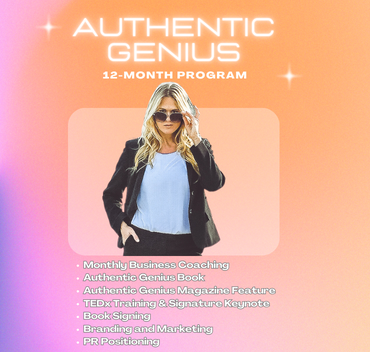by Luba Sakharuk
The rise of generative AI is unlocking new possibilities across industries. Powerful systems like ChatGPT and Anthropic’s Claude can generate human-like content with unprecedented speed and scale. While ChatGPT tends to hallucinate facts and mimic without contextual awareness, Claude offers truthful, helpful responses by design thanks to Constitutional AI.
I recently experienced the potential of this technology firsthand. When asked to develop a workshop on leveraging generative AI to boost professional credibility, I decided to have Claude suggest a compelling title and learning objective. Within seconds, it proposed “Establishing Expertise in the AI Era” with the goal of “Examining how generative AI can augment human intelligence to increase authority and trustworthiness.”
The creative yet thoughtful suggestions demonstrated Claude’s ability to capture the essence of my workshop. With some light editing for tone, I arrived at a title and focus faster than I could on my own. It gave me confidence that strategic use of generative AI can enhance expertise rather than replace it.
In this article, we will explore practical applications of tools like Claude to strengthen credibility as thought leaders and professionals. With a human-centric approach, AI can turbocharge research, ideation, content creation and other workflows. I’ll share an example to position you on the cutting edge of establishing expertise in the AI-augmented future. Let’s dive in!

How Many Generative Ai Tools Are Out There?
According to Claude.ai, a popular Generative Ai Tool,
There are a number of generative AI tools and models that have emerged in recent years. Here is a summary of some of the major generative AI systems as of January 2024:
- Large language models: GPT-3, Jurassic-1 J, Megatron Turing-NLG 530B, Anthropic’s Claude
- Image generators: DALL-E 2, Stable Diffusion, Midjourney, Imagen
- Audio/music generators: Jukebox, Amper Music, Amazon Songsmith
- Video generators: Cicero, Phenaki
- 3D model generators: Neural Radiance Fields, GANverse3D
- Code generators: GitHub Copilot, DeepTabNine, TabNine
- Mathematical equation generators: Anthropic’s Claude, Wolfram Alpha
- Data synthesizers: Synthesia, DataSynthesizer, SDGym
- General purpose: Anthropic’s Claude, Google Imagen Video

While it’s difficult to provide an exact count, some estimates suggest there are over 50 notable generative AI tools and models across modalities like text, image, audio and more. The field is rapidly evolving with new advancements being made monthly. 2024 will likely see even more sophisticated and specialized generative AI systems emerge. But this list covers some of the most prominent tools and models powering real-world generative applications today.
It is worth mentioning, that when I asked the same question ChatGpt 3.5, the answer was simply that it didn’t have the information and it suggested the following,
“To obtain the most accurate and up-to-date information, I recommend checking reputable sources, official websites, or industry reports that track the latest developments in the field of generative AI. As of my last update, some well-known generative AI tools included OpenAI’s GPT-3, NVIDIA’s StyleGAN, and various models developed by companies like Google, Facebook, and Microsoft. However, the landscape may have evolved since then.”
When I then asked to list the top 25 Generative AI tools as of January 2024, it didn’t even mention Claude.ai ;). I guess ChatGpt is very competitive and doesn’t like its most common competitor.
What are the top 5 competitors of ChatGPT according to Calude.ai?
1. Anthropic’s Claude
Anthropic is a prominent AI safety startup that has developed Claude, an AI assistant focused on harmless, honest and helpful interactions. Claude is one of the top contenders to match or even surpass ChatGPT’s capabilities while avoiding its safety issues.
2. Google Bard
Google recently announced its conversational AI called Bard to directly compete with ChatGPT. It is still in limited testing but Google has massive resources to make rapid progress.
3. Microsoft Bing AI
Microsoft integrated a large language model into Bing search, aiming to enhance search results with generative capabilities. Given Microsoft’s scale, Bing AI has potential.
4. You.com
You.com is a new AI-powered search engine that some experts believe could evolve into a strong competitor to ChatGPT. It was founded by ex-Salesforce executives.
5. Cohere
Cohere provides large language model APIs and interfaces for businesses to easily build applications. It has strong generative capabilities making it a viable alternative.
Other notable competitors include AI21 Labs, Aleph Alpha, Meta’s Blender Bot, and Amazon may eventually enter the space. But ChatGPT’s biggest challengers are likely Google, Microsoft, and Anthropic in the short term.
Example of Leveraging AI Tools To Boost Credibility
If you are not yet convinced why one would care about boosting your credibility, here are 3 key reasons to boost your credibility:

- Increased Influence – Higher credibility builds trust and expands your ability to persuade, elevate your impact.
- Growth Opportunities – Demonstrating expertise can advance your career, attract new clients, increase compensation.
- Amplified Reach – Establishing authority provides industry and media visibility, strategic partnerships, platform to make a difference.
Here is what I noticed in my career journey as I started focusing on boosting credibility and sharing my expertise:
By simply sharing that certain topics were of interest to me on social media, via magazine articles and authoring books, more opportunities came my way to share what I have learned. The more I shared, the more opportunities came my way. I have used ChatGpt for many of my LinkedIn posts to announce new books published and all the new retreats and masterminds coming up as part of RALM3 Consulting effort to support, empower and boost credibility for women in tech, women thought leaders and entrepreneurs.
The output of any AI tool is as good as the question you ask and the information you feed it. In some cases, it is worth asking the same question in multiple tools and seeing which of the results is closest to what you had in mind. I found that ChatGPT is better at LinkedIn posts where Claude.ai is better to leverage for articles’ content. You can feed Calude.ai a full article or a keynote, ask for a strong conclusion and within seconds, it will produce a pretty incredible piece of writing!
One day, I was approached with an opportunity to teach a workshop on Generative AI at a mastermind. I was intrigued but of course, questioned, if I was the right person for the job.
Although I have studied AI for a while and experimented with various tools, I wasn’t sure if it was sufficient to actually run a workshop on the topic. After a short brainstorming session with the organizer of the event, I agreed. I was then tasked with providing the learning objective for the workshop and that’s where I turned to the Generative AI! Within seconds, the following learning objective was generated and I had a clear vision of I would be teaching during that workshop,
Description:
Unlock the secrets to enhancing credibility through AI in this engaging 1-hour workshop. Discover practical strategies and tools to boost your professional standing in the digital age.
Learning Objectives:
1. Harness AI for Personal Branding: Learn to leverage AI tools to strengthen your personal brand and amplify your online presence effectively.
2. Navigate Ethical AI Use: Understand the ethical considerations of AI and develop a framework for responsible and trustworthy engagement with AI technologies.
3. Mastering AI-Driven Decision-Making: Acquire skills to make informed decisions by incorporating AI insights, enhancing your credibility through data-driven approaches.
I now could take a step further and leverage a generative AI tool to come up with a full curriculum of the workshop for this learning Objectives but let’s leave it for another time! If you are intrigued, I encourage you to experiment!
Conclusion
Note: The following conclusion was generated by Claude.ai by pasting the full article into Claude.ai and asking it to generate a strong conclusion! What do you think of the quality?!
The rise of generative AI represents a pivotal moment for professionals seeking to establish expertise and credibility. As we have explored, tools like Claude and ChatGPT have incredible potential to augment human intelligence and creativity. However, a thoughtful, ethical approach is required to determine appropriate applications versus overreliance on AI.
By strategically utilizing generative models to enhance research, ideation, and content production, we can accelerate knowledge discovery and dissemination. But human judgment, critical analysis and originality remain vital. AI should not aim to replicate human thinking, but rather support it.
If leveraged judiciously with realistic expectations, AI can help us gain
knowledge, crystallize ideas, and communicate insights more powerfully. This serves to boost credibility and open doors for impact. But the human element – our compassion, ethics and emotional intelligence – is irreplaceable.
In closing, generative AI sets the stage for an exciting future defined by human-machine collaboration. With a balanced, human-centric approach we can establish expertise and earn trust in the AI era. If guided by wisdom, these technologies can help unlock our creative potential and expand the influence of our best ideas.





